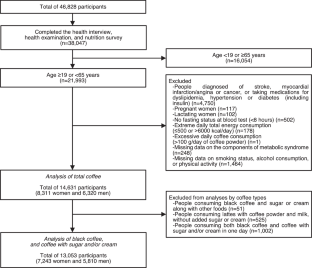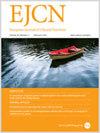韩国成年人饮用咖啡与代谢综合征之间的关系
IF 3.3
3区 医学
Q2 NUTRITION & DIETETICS
引用次数: 0
摘要
背景/目的:关于咖啡消费与代谢综合征(MetS)之间关系的研究,考虑到了不同的咖啡类型,但报告的结果并不一致。我们利用 2016 年至 2021 年对 14631 名 19-64 岁成年人进行的韩国国民健康和营养调查数据,研究了咖啡饮用量与代谢综合征之间的关系,并考虑了咖啡的种类:我们采用 24 小时饮食回忆法来评估饮食情况,包括饮用咖啡的种类和数量。咖啡分为黑咖啡和加糖和/或奶油的咖啡(不喝咖啡者,每天≤1杯、2-3杯和>3杯)。采用多变量逻辑回归模型研究咖啡饮用量与 MetS(根据统一标准定义)之间的关系:在对潜在的协变量进行调整后,女性每天饮用 2-3 杯黑咖啡与 MetS 呈反比关系(OR = 0.66;95% CI = 0.46-0.96)。女性每天喝三杯或三杯以下黑咖啡与高密度脂蛋白胆固醇(HDL-C)过低和甘油三酯升高成反比。男性饮用咖啡与 MetS 的关系不大。饮用加糖和/或奶油的咖啡或每天饮用三杯以上的咖啡与 MetS 总体关系不大:我们的研究结果表明,每天适量饮用 2-3 杯黑咖啡与女性的 MetS 呈反向关系,这可能是由于黑咖啡对高密度脂蛋白胆固醇和甘油三酯具有有利影响。为了提供确切的证据,有必要进一步开展前瞻性研究,探讨饮用不同种类的咖啡与 MetS 的关系。本文章由计算机程序翻译,如有差异,请以英文原文为准。


Association between coffee consumption and metabolic syndrome in Korean adults
Studies examining the association between coffee consumption and metabolic syndrome (MetS), considering different coffee types, have reported inconsistent results. We investigated the relationship between coffee consumption and MetS, taking into account coffee types, using data from the Korea National Health and Nutrition Examination Survey conducted from 2016 to 2021 among 14,631 adults aged 19–64 years. We used a 24-h dietary recall method to assess diet, including the type and quantity of coffee consumed. Coffee was categorized into black coffee and coffee with sugar and/or cream (non-drinkers, ≤1, 2–3, and >3 cups/day). Multivariable logistic regression models were utilized to investigate the relationship between coffee consumption and MetS, defined by the harmonized criteria. After adjusting for potential covariates, for women, 2–3 cups/day of black coffee were inversely associated with MetS (OR = 0.66; 95% CI = 0.46–0.96). Three or fewer cups per day of black coffee were inversely associated with low high-density lipoprotein cholesterol (HDL-C) and elevated triglycerides in women. Coffee consumption was not significantly associated with MetS in men. Consumption of coffee with sugar and/or cream or more than three cups per day of coffee was not significantly associated with MetS overall. Our findings suggest that moderate of 2–3 cups/day of black coffee consumption is inversely associated with MetS in women, possibly due to its favorable impact on HDL-C and triglycerides. Further prospective studies examining the consumption of different coffee types in relation to MetS are warranted to offer definitive evidence.
求助全文
通过发布文献求助,成功后即可免费获取论文全文。
去求助
来源期刊
CiteScore
10.60
自引率
2.10%
发文量
189
审稿时长
3-6 weeks
期刊介绍:
The European Journal of Clinical Nutrition (EJCN) is an international, peer-reviewed journal covering all aspects of human and clinical nutrition. The journal welcomes original research, reviews, case reports and brief communications based on clinical, metabolic and epidemiological studies that describe methodologies, mechanisms, associations and benefits of nutritional interventions for clinical disease and health promotion.
Topics of interest include but are not limited to:
Nutrition and Health (including climate and ecological aspects)
Metabolism & Metabolomics
Genomics and personalized strategies in nutrition
Nutrition during the early life cycle
Health issues and nutrition in the elderly
Phenotyping in clinical nutrition
Nutrition in acute and chronic diseases
The double burden of ''malnutrition'': Under-nutrition and Obesity
Prevention of Non Communicable Diseases (NCD)

 求助内容:
求助内容: 应助结果提醒方式:
应助结果提醒方式:


